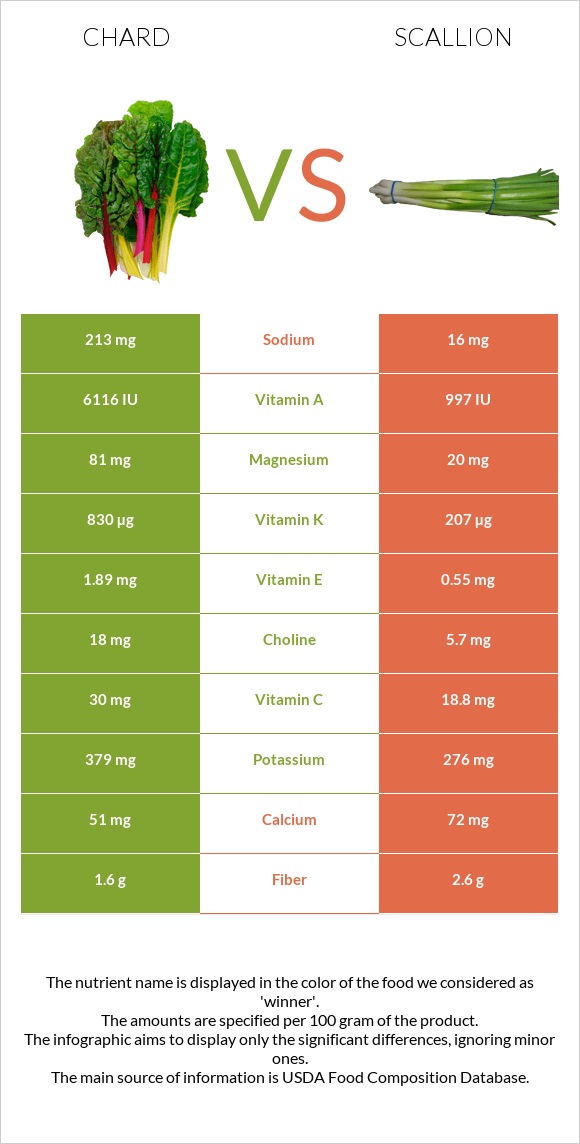Chard vs. Scallion — In-Depth Nutrition Comparison
Compare
How are chard and scallions different?
- Chard is higher in vitamin A, vitamin K, magnesium, iron, vitamin E, copper, potassium, and manganese; however, scallions are richer in folate.
- Daily need coverage for vitamin A for chard is 103% higher.
- Chard contains 11 times more sodium than scallions. While chard contains 179mg of sodium, scallions contain only 16mg.
Chard, swiss, cooked, boiled, drained, without salt and Onions, spring or scallions (includes tops and bulb), raw are the varieties used in this article.
Infographic

Infographic link
Mineral Comparison
Mineral comparison score is based on the number of minerals by which one or the other food is richer. The "coverage" charts below show how much of the daily needs can be covered by 300 grams of the food.
| Contains more MagnesiumMagnesium | +330% |
| Contains more PotassiumPotassium | +98.9% |
| Contains more IronIron | +52.7% |
| Contains more CopperCopper | +96.4% |
| Contains more ManganeseManganese | +108.8% |
| Contains more SeleniumSelenium | +50% |
| Contains more CalciumCalcium | +24.1% |
| Contains more ZincZinc | +18.2% |
| Contains more PhosphorusPhosphorus | +12.1% |
| Contains less SodiumSodium | -91.1% |
Vitamin Comparison
Vitamin comparison score is based on the number of vitamins by which one or the other food is richer. The "coverage" charts below show how much of the daily needs can be covered by 300 grams of the food.
| Contains more Vitamin AVitamin A | +512% |
| Contains more Vitamin EVitamin E | +243.6% |
| Contains more Vitamin B5Vitamin B5 | +117.3% |
| Contains more Vitamin B6Vitamin B6 | +39.3% |
| Contains more Vitamin KVitamin K | +58.1% |
| Contains more Vitamin B1Vitamin B1 | +61.8% |
| Contains more Vitamin B3Vitamin B3 | +45.8% |
| Contains more FolateFolate | +611.1% |
All nutrients comparison - raw data values
| Nutrient |  |
 |
DV% diff. |
| Vitamin K | 327.3µg | 207µg | 100% |
| Vitamin A | 306µg | 50µg | 28% |
| Magnesium | 86mg | 20mg | 16% |
| Folate | 9µg | 64µg | 14% |
| Iron | 2.26mg | 1.48mg | 10% |
| Copper | 0.163mg | 0.083mg | 9% |
| Vitamin E | 1.89mg | 0.55mg | 9% |
| Potassium | 549mg | 276mg | 8% |
| Manganese | 0.334mg | 0.16mg | 8% |
| Sodium | 179mg | 16mg | 7% |
| Choline | 28.7mg | 5.7mg | 4% |
| Fiber | 2.1g | 2.6g | 2% |
| Vitamin B1 | 0.034mg | 0.055mg | 2% |
| Vitamin B5 | 0.163mg | 0.075mg | 2% |
| Vitamin B6 | 0.085mg | 0.061mg | 2% |
| Calories | 20kcal | 32kcal | 1% |
| Vitamin C | 18mg | 18.8mg | 1% |
| Carbs | 4.13g | 7.34g | 1% |
| Calcium | 58mg | 72mg | 1% |
| Zinc | 0.33mg | 0.39mg | 1% |
| Phosphorus | 33mg | 37mg | 1% |
| Selenium | 0.9µg | 0.6µg | 1% |
| Vitamin B3 | 0.36mg | 0.525mg | 1% |
| Protein | 1.88g | 1.83g | 0% |
| Fats | 0.08g | 0.19g | 0% |
| Net carbs | 2.03g | 4.74g | N/A |
| Sugar | 1.1g | 2.33g | N/A |
| Vitamin B2 | 0.086mg | 0.08mg | 0% |
| Saturated fat | 0.012g | 0.032g | 0% |
| Monounsaturated fat | 0.016g | 0.027g | 0% |
| Polyunsaturated fat | 0.028g | 0.074g | 0% |
| Tryptophan | 0.018mg | 0.02mg | 0% |
| Threonine | 0.086mg | 0.072mg | 0% |
| Isoleucine | 0.154mg | 0.077mg | 0% |
| Leucine | 0.135mg | 0.109mg | 0% |
| Lysine | 0.103mg | 0.091mg | 0% |
| Methionine | 0.02mg | 0.02mg | 0% |
| Phenylalanine | 0.114mg | 0.059mg | 0% |
| Valine | 0.114mg | 0.081mg | 0% |
| Histidine | 0.038mg | 0.032mg | 0% |
Macronutrient Comparison
Macronutrient breakdown side-by-side comparison
| Contains more OtherOther | +55.6% |
| Contains more FatsFats | +137.5% |
| Contains more CarbsCarbs | +77.7% |
~equal in
Protein
~1.83g
~equal in
Water
~89.83g
Fat Type Comparison
Fat type breakdown side-by-side comparison
| Contains less Sat. FatSaturated fat | -62.5% |
| Contains more Mono. FatMonounsaturated fat | +68.8% |
| Contains more Poly. FatPolyunsaturated fat | +164.3% |





